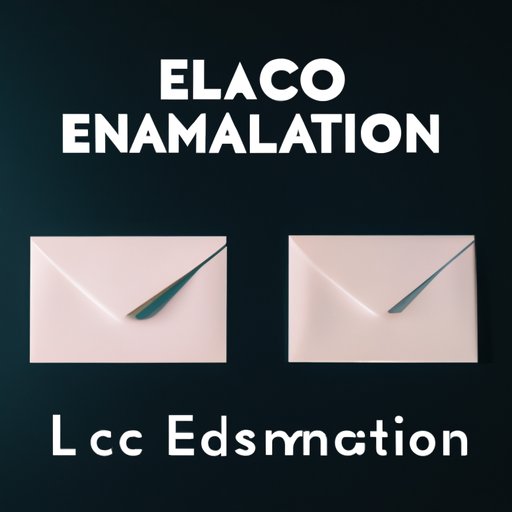
Introduction
Email communication has become a crucial part of our daily lives, especially in today’s digital age where most professional and personal interactions occur online. With millions of emails being sent and received every day, it’s important to know how to craft effective emails that convey your message in a way that is clear, concise, and professional. This guide is designed to help readers understand the best practices for email communication and become more proficient in effective email writing.
6 Golden Rules for Crafting Effective Emails
Following these rules will help you write effective emails that will be clear and engaging to the recipients:
- Be clear and concise: Keep your message brief, to the point, and avoid unnecessary details.
- Use proper grammar and punctuation: Poor grammar, punctuation, or spelling can make your emails appear unprofessional.
- Avoid using all caps or too many exclamation marks: Using all caps or multiple exclamation marks can come across as rude or aggressive.
- Use a clear and appropriate subject line: Your subject line should reflect the content of your email and be concise.
- Address the recipient appropriately: Use the appropriate name and title when addressing your recipients.
- Proofread before hitting send: Make sure to reread your email before sending it to avoid any mistakes.

Elevate your Communication: A Guide to Email Etiquette
While following the golden rules above is important, there is more to email communication than just the technical aspects. Here are some etiquette tips:
- Be polite and professional: Use a polite, formal tone and avoid using slang or overly casual language.
- Use a professional email signature: Your email signature should include your name, job title, and contact information.
- Don’t CC unnecessary people: Only CC people who need to be involved in the conversation.
- Use a formal style for business emails: Business emails should be more formal, while personal emails can be more casual.
- Avoid oversharing personal information: Personal information should not be shared unless relevant to the conversation.
Mastering the Art of Email Communication: 6 Key Tips
When crafting emails, it is important to understand the purpose of your message and how to communicate it effectively. Here are some tips:
- Identify the purpose of your email before you start writing: Knowing the main purpose of your email can help you keep the message brief and on-point.
- Use bullet points to clarify important information: Bullet points can make your message easier to read and understand.
- Keep emails short and to the point: Long emails can be overwhelming and may not be read in their entirety.
- Don’t bury the lead: Start your email with the most important information.
- Use formatting to make your email easy to read: Use bold or italics to highlight important information, or break up large paragraphs with subheadings.
- Respond in a timely manner: Responding promptly shows the recipient that you value their time and are invested in the conversation.
Maximizing Your Emails: 6 Strategies for Better Communication
Here are some strategies to consider when crafting effective emails:
- Use active voice to make your emails more engaging: Active voice is more interesting to read than passive voice and can make your message more compelling.
- Provide context for what you’re discussing: Providing context can help the recipient understand the message more clearly.
- Use graphics or visuals to support your message: Images and charts can quickly and effectively communicate a message.
- Use positive language to create a positive tone: Using positive language creates a more uplifting and encouraging tone in your email.
- Provide a clear call to action: Your email should have a clear purpose and the recipient should know what they need to do next.
- Consider the recipient when crafting your email: Understanding the recipient’s perspective can help you tailor your message to their needs and interests.
Slaying the Email Game: Top 6 Tips for Writing Effective Emails
Here are some of the best tips to help you improve your email communication:
- Use clear language and avoid jargon: Write in a way that is easy to understand and avoid using technical jargon or industry-specific terms.
- Consider the tone of your message: Your message should convey the appropriate tone for the context in which it is being sent.
- Use a friendly and accessible tone: A friendly tone can help create a connection with the recipient and make your message more approachable.
- Use actionable language: Your message should include a clear call to action and use language that inspires action.
- Use a clear and concise subject line: The subject line should be relevant and to the point.
- End with a call to action: Your email should end with a clear and concise request or call to action.
Boost Your Professionalism with These 6 Email Tips
If you want to impress your clients or coworkers with your professionalism, consider these tips:
- Think about the recipient’s perspective: Focus on what will be relevant and helpful to them.
- Use a professional email address: Avoid using personal or unprofessional email addresses.
- Pay attention to the details: Small details, such as spelling and grammar, can make a big difference in how your email is perceived.
- Provide accurate contact information: Make sure to include your contact information in your email signature.
- Use a clear and concise message: Brevity is key – keep your message short and to the point.
- End your email with a professional closing: Use a professional closing to end your email and communicate respect for the recipient.
Conclusion
Effective email communication is an essential skill in today’s world. Whether you’re emailing clients, coworkers or friends, following the tips outlined in this guide will help you write emails that are clear, concise, and professional. Remember to be polite, proofread your message, and keep it brief and focused. In the end, your emails will be more effective and lead to better connections and relationships.





